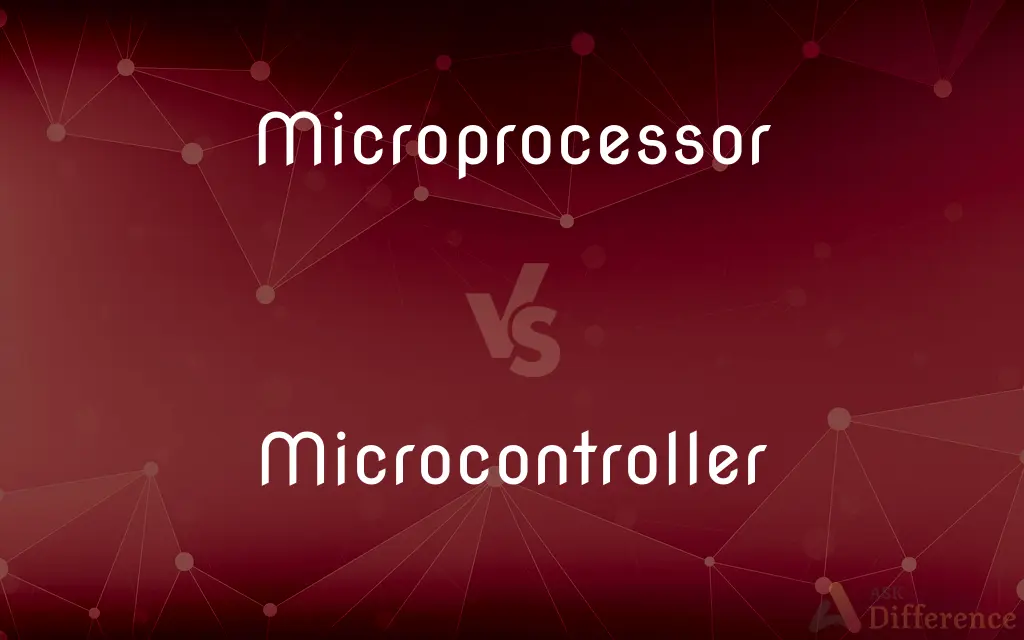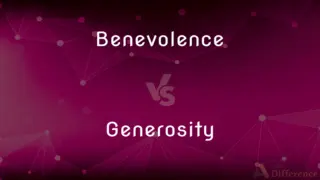Microprocessor vs. Microcontroller — What's the Difference?
By Tayyaba Rehman — Published on October 5, 2023
A microprocessor is the central unit of a computer system primarily designed for data processing and computing tasks, while a microcontroller integrates a microprocessor with memory and peripheral interfaces, designed for specific control tasks.

Difference Between Microprocessor and Microcontroller
Table of Contents
ADVERTISEMENT
Key Differences
Microprocessors and microcontrollers are both integral components in the world of electronics, but they serve different purposes. A microprocessor, often termed the "brain" of a computer system, focuses primarily on tasks related to data processing and computing. It's the powerhouse that manages and performs arithmetic and logical operations. In contrast, a microcontroller is more specialized. While it contains a microprocessor within, it also integrates memory and peripheral interfaces, making it ideal for specific control tasks, such as operating appliances or embedded systems.
Diving deeper, the microprocessor is essentially a CPU or the central processing unit. It doesn't possess its own RAM, ROM, or other peripherals, requiring external components for functionality. The microcontroller, however, is a self-sufficient unit, housing its own RAM, ROM, and I/O ports. This compact design is tailored for control-oriented tasks in products like washing machines, microwave ovens, and more.
Moreover, when considering applications, microprocessors are commonly found in devices that require substantial computational power, such as desktops, laptops, and servers. On the other hand, microcontrollers shine in applications where control and interfacing are pivotal, and they're prevalent in embedded systems and numerous everyday appliances.
In terms of scalability, microprocessors offer more flexibility. They can be integrated into larger systems, and their performance can be augmented with additional components. Microcontrollers, while versatile within their domain, have a more defined boundary due to their specific-use design.
Comparison Chart
Primary Function
Data processing and computing tasks.
Specific control tasks.
ADVERTISEMENT
Components
Central processing unit (CPU) only.
CPU, RAM, ROM, and I/O ports.
Applications
Desktops, laptops, servers.
Embedded systems, appliances, control systems.
Scalability
Highly scalable with external components.
Defined boundary due to specific-use design.
Integration
Requires external memory and interfaces.
Self-contained with its own memory and interfaces
Compare with Definitions
Microprocessor
Handles arithmetic and logical operations.
The efficiency of software often relies on the microprocessor's power.
Microcontroller
Used in embedded applications for dedicated functions.
The digital watch utilizes a microcontroller to manage its features.
Microprocessor
An integrated circuit executing instructions.
The device's speed depends on its microprocessor's capability.
Microcontroller
Contains a microprocessor, memory, and I/O ports.
Embedded systems often employ microcontrollers due to their compact nature.
Microprocessor
The central processing unit of a computer system.
Modern PCs are powered by advanced microprocessors.
Microcontroller
An integrated circuit designed for specific control tasks.
The microcontroller in this thermostat allows for precise temperature adjustments.
Microprocessor
A digital electronic component for processing data.
The microprocessor in this machine can handle complex calculations swiftly.
Microcontroller
Self-contained unit for control-oriented tasks.
This remote-controlled car operates using a small microcontroller.
Microprocessor
Main computational engine in a computer.
Upgrading the microprocessor can boost a computer's performance.
Microcontroller
Controls devices and appliances through embedded systems.
Modern refrigerators have microcontrollers that manage various settings.
Microprocessor
A microprocessor is a computer processor wherein the data processing logic and control is included on a single integrated circuit, or a small number of integrated circuits. The microprocessor contains the arithmetic, logic, and control circuitry required to perform the functions of a computer’s central processing unit.
Microcontroller
A microcontroller (MCU for microcontroller unit) is a small computer on a single metal-oxide-semiconductor (MOS) integrated circuit (IC) chip. A microcontroller contains one or more CPUs (processor cores) along with memory and programmable input/output peripherals.
Microprocessor
An integrated circuit that contains a major processing unit of a computer on a single microchip, such as the central processor or the graphics processor.
Microcontroller
A microcomputer on a single chip, used to control some device such as an automobile engine or a toy.
Microprocessor
(computer hardware) the entire CPU of a computer on a single integrated circuit (chip).
Microprocessor
Integrated circuit semiconductor chip that performs the bulk of the processing and controls the parts of a system;
A microprocessor functions as the central processing unit of a microcomputer
A disk drive contains a microprocessor to handle the internal functions of the drive
Common Curiosities
Are microprocessors and microcontrollers interchangeable?
Not usually. While they have overlapping capabilities, microprocessors are for general computing tasks, and microcontrollers are for specific control tasks.
Are microcontrollers mainly used in industrial applications?
They are prevalent in industrial settings, but they're also common in everyday devices and appliances.
What role does a microprocessor play in a microcontroller?
The microprocessor within a microcontroller handles the computational and logical operations.
Do microprocessors have built-in memory?
Typically, no. Microprocessors require external memory, while microcontrollers have built-in memory.
Which has a broader application range: microprocessor or microcontroller?
Microprocessors have a broader application in computing, while microcontrollers focus on control-specific tasks.
Are microprocessors more complex than microcontrollers?
Not necessarily. Microprocessors are more flexible and scalable, while microcontrollers are integrated and specific-use.
Which is more power-efficient: a microprocessor or a microcontroller?
Generally, microcontrollers are more power-efficient, as they're designed for specific tasks.
Can you find microprocessors in smartphones?
Yes, smartphones use microprocessors for their core computational tasks.
Do all microcontrollers have built-in memory?
While most do, the type and amount of memory can vary based on the microcontroller's design and purpose.
Can a microcontroller function without a microprocessor?
No. A microcontroller integrates a microprocessor within its design.
Are microcontrollers more cost-effective than microprocessors?
Generally, yes. Microcontrollers, being self-contained, can be more cost-effective for specific applications.
Can a single device have both a microprocessor and a separate microcontroller?
Yes, some complex devices might require the general processing power of a microprocessor and the control-specific functions of a microcontroller.
Which is typically faster: a microprocessor or a microcontroller?
Microprocessors are generally faster as they're designed for intensive data processing.
Why do embedded systems prefer microcontrollers?
Microcontrollers are compact, self-contained, and efficient for specific control tasks, making them ideal for embedded systems.
Which is better for an IoT device: microprocessor or microcontroller?
It depends on the device's needs. Many IoT devices use microcontrollers for their efficiency and specific control capabilities.
Share Your Discovery

Previous Comparison
Publicity vs. Public Relations
Next Comparison
Benevolence vs. GenerosityAuthor Spotlight
Written by
Tayyaba RehmanTayyaba Rehman is a distinguished writer, currently serving as a primary contributor to askdifference.com. As a researcher in semantics and etymology, Tayyaba's passion for the complexity of languages and their distinctions has found a perfect home on the platform. Tayyaba delves into the intricacies of language, distinguishing between commonly confused words and phrases, thereby providing clarity for readers worldwide.
















































